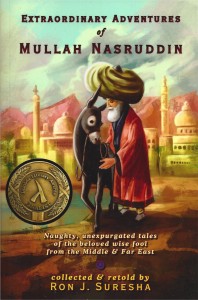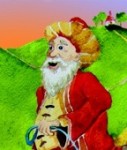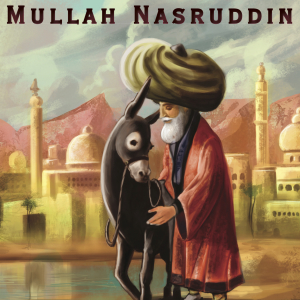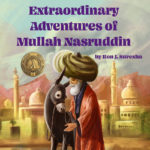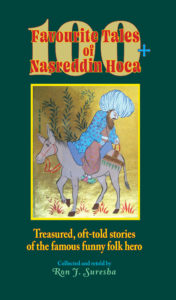Preface, part 1
An excerpt from Extraordinary Adventures of Mullah Nasruddin
Coming from an ethnically diverse family with strong oral and literary folklore traditions, I became well acquainted early on with the stories of the famous Turkish folk character, Mullah Nasruddin; a simple man of renowned humor and inscrutable wisdom, known for more than eight centuries in his native land as Nasreddin Hoca.
Sometimes my mother would tell a joke or story about the “wise fool” Mulla Nasaruddin (as he is called in Jewish folklore), usually to make a point about my contrary behavior. She would often ask, for instance, “Why do you always answer a question with another question?” to which I could be reliably predicted to retort, “Oh really, do I‽”
In my twenties, while living in several ashram (residential yoga center) communities in the U.S.A. and India, my teachers would often tell, with great relish and humor, Sheikh Nasruddin “wisdom stories” as part of their regular lessons and lectures on spiritual life.
For more than two decades, Sufi writer Idries Shah’s collections of Mullah Nasruddin stories were my only sources in English. Then, in 1999, while on my first trip to Istanbul, I acquired five Turkish-published volumes of Mullah stories in English, which were illustrated with cartoon tableaux depicting the adulterated punch-line moments from the most popular stories. Shortly after, I began to discover additional Nasreddin Hoca folklore sources online.
While compiling the first book, The Uncommon Sense of the Immortal Mullah Nasruddin, I volunteered to help reorganize the storybook collection of the Connecticut Storytelling Center in New London, where I encountered several antiquarian Nasreddin volumes in various languages. Since then I have continued to gather and collate printed books and manuscripts in English, Hebrew, Spanish, German, French, Turkish, and Hindi, as well as material published online, all of which are included in the Sources following the text of this work.
The revised 2013 edition of Uncommon Sense is an anthology of more than 365 authentic individual stories, anecdotes, jokes, jests, and quips arranged biographically into seven parts with seven sections of seven stories each. While certainly many pieces could be considered bawdy, abusive, or ethnic, the material was generally suitable for a collegiate adult readership, including hundreds of stories entirely appropriate for children. Sgott Mackensie’s watercolor cover illustration of the bewhiskered, turbaned Mullah, happily riding his beloved donkey backward in a rural setting, reflected the book’s broad appeal and presented it as a “PG-13” collection appropriate for teenagers with parental guidance. The positive critical reviews to the first book made it absolutely clear, however, that a second volume featuring the X-rated material would be a welcome addition to world literature.
While researching the topic of taboo humor I discovered, in The Horn Book by folklore and humor scholar Gershon Legman, his stark condemnation of folk story and joke collections with all the bawdy or “objectionable” material expunged, which he calls “fakelore.” Despite my earnest efforts to locate such risqué stories with limited success, I naturally cringed at the implication that I had unwittingly committed some sort of literary and folkloric misdeed by excluding the naughty and nasty tales of my old friend, Mullah Nasruddin.
Given the immense volume of this character’s folklore, I was perplexed by the conspicuous absence of adult-themed stories among the hundreds I had indexed. The dearth of racy, earthy, profane, or ethnic material in the existing published folklore available to me seemed due in part to its exclusion from popular children’s presentations of the often-moralizing Mullah. My theory was that these “naughty Nasreddin” narratives were expurgated from popular representations of Nasreddin in an effort to “reform” the character, according to the moral codes imposed by both Islamist and Turkish nationalistic influences.
German Nasreddin scholar Ulrich Marzolph’s 1998 analysis, “What Is Folklore Good For?” asserts that “Early Turkish manuscripts comprised a large amount of sexual, scatological, and otherwise disputable material” about the “vigorous and vulgar” Mullah (1998, p. 7). With that concept in mind, I delved even deeper into scholarly texts in search of this taboo material.
Though the character’s Ottoman-Turkish name is Nasreddin Hoca, cognates such as Mullah or Sheikh Nasruddin, Djuha, Joha, Hodja, Abu Nuwas, and so on populate the folklore of many Asian, African, European, and other lands worldwide and share their narratives, so there are diverse cultural sources contributing to this collection. I refer to the character throughout the text as Mullah Nasruddin because that is how I first came to know him.
The most readily accessible bawdy Nasreddin stories employ scatological, ethnic, racial, and sexist humor. Tales involving Nasreddin’s wife and marital affairs are most prevalent, and many feature her as the sexual aggressor. The “young Nasruddin” tales often portray his pubescent sexual explorations and cunning sexual exploitation of women. Sexual stories involving Nasreddin’s donkey make up a third recurring theme. Oddly, storylines with overtly homosexual themes were most difficult to unearth: even putting out a call for such jokes among today’s Istanbul’s gay and bisexual men’s “bear” community yielded no results.
Concluded next week
Works cited
Gűrkaş, Hakkı. Nasreddin Hodja and the Akşehir Festival: Invention of a Festive Tradition and Transfigurations of a Trickster, from Bukhara to Brussels. Ph.D dissertation. West Lafayette, Ind.: Purdue University, 2008.
Karabas, Seyfi. “The Use of Eroticism in Nasreddin Hoca Anecdotes.” Western Folklore 49: 3 (July 1990), pp. 299–305. Long Beach, Calif.: Western States Folklore Society.
Legman, Gershon. The Horn Book: Studies in Erotic Folklore and Bibliography. New Hyde Park, N.Y.: University Books, 1964.
Marzolph, Ulrich. What Is Folklore Good For? On dealing with undesirable cultural expression. Journal of Folklore Research, 35: 1 (Jan.–Apr. 1998), pp. 5–16.
Whitman, Walt. Leaves of Grass. New York: New American Library, 1980.

